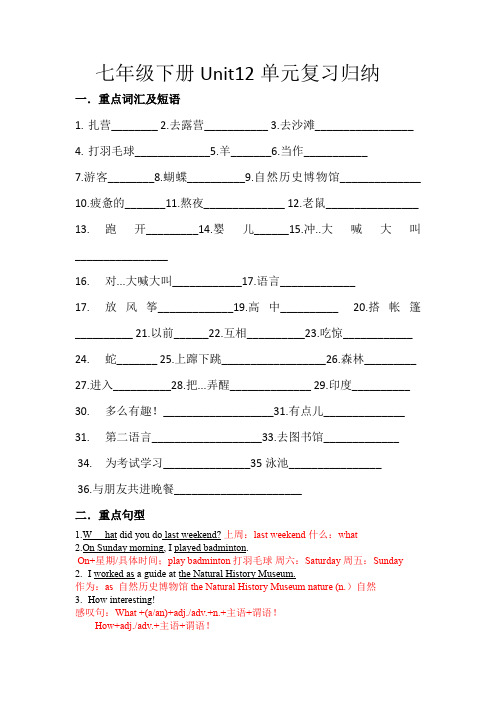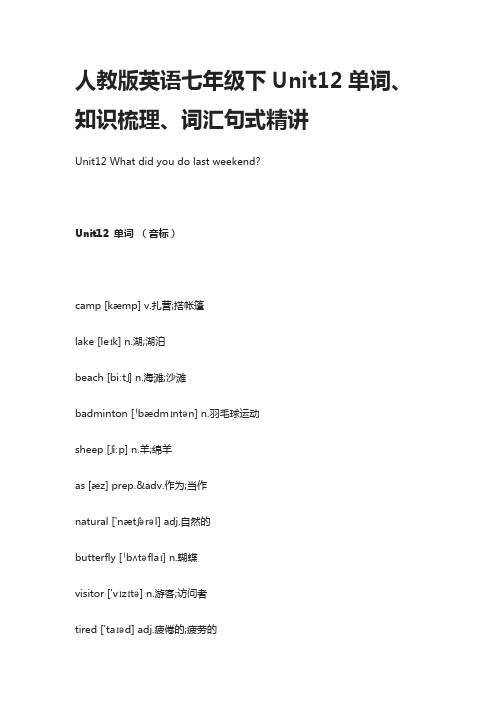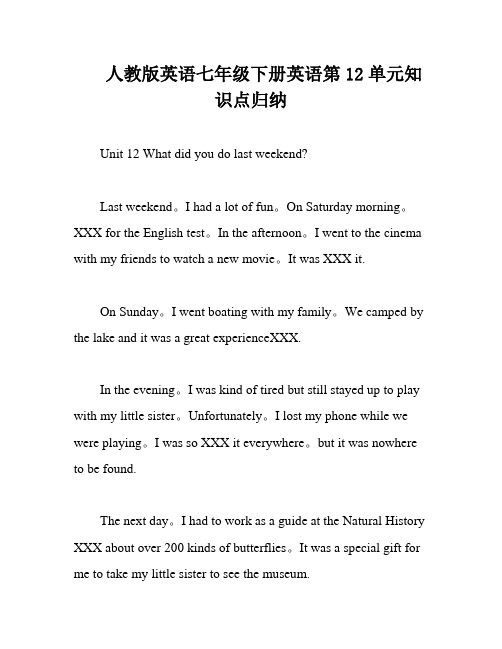七年级下 12单元
七年级下册英语12单元单词

七年级下册英语12单元单词Unit 12 What did you do last weekend?一、重点单词。
1. camp [kæmp]- v. 扎营;搭帐篷。
- n. 露营;营地。
2. lake [leɪk] n. 湖;湖泊。
3. beach [biːtʃ] n. 海滩;沙滩。
4. badminton [ˈbædmɪntən] n. 羽毛球运动。
5. sheep [ʃiːp] n. 羊;绵羊(单复数同形)6. as [æz] prep. & adv. 作为;当作。
7. natural [ˈnætʃrəl] adj. 自然的。
8. butterfly [ˈbʌtəflaɪ] n. 蝴蝶。
9. visitor [ˈvɪzɪtə(r)] n. 游客;访问者。
10. tired [ˈtaɪəd] adj. 疲倦的;疲劳的。
11. stay [steɪ] v. 停留;待。
12. stay up late 深夜不睡;熬夜。
13. away [əˈweɪ] adv. 离开;远离。
14. run away 跑开。
15. mouse [maʊs] n. 老鼠;耗子(复数mice [maɪs])16. baby [ˈbeɪbi] adj. 幼小的。
- n. 婴儿。
17. shout [ʃaʊt] v. 呼叫;喊叫。
18. shout at…冲……大声叫嚷。
19. woof [wʊf] interj. (狗叫声)汪汪。
20. language [ˈlæŋɡwɪdʒ] n. 语言。
21. fly [flaɪ]- v. 飞。
- n. 苍蝇。
22. kite [kaɪt] n. 风筝。
23. fly a kite 放风筝。
24. high [haɪ] adj. & adv. 高的(地)25. high school 中学。
26. ago [əˈɡəʊ] adv. 以前。
七年级下册英语第十二单元

第12单元
1.写作业 do one’s homework (homework 不可数) 2、看电影 go to the cinema=see a film=go to the movies 3、去划船 go boating 4湖边搭帐篷 camp by the lake 5去海滩、沙滩 go to the beach
1.作为、当作 努力工作 as Work hard 2、作为一名老师 工作到很晚 work as a teacher work late Work as 作为---(职业名词 从事、继续工作 在小地方工作 work on work at 解决、计算出 在大地方工作 Work out work in 3、告诉某人关于某事 与谁共事 ,与谁合作 tell sb about sth work with sb 4、告诉某人某事 tell sth to sb
1、我太累了以至于再也走不5、知道关于这个危险 动了 know about the danger I am so tired that I can’t 6、开始做某事 work on= I am too tired to work on start to do=start doing 2、入睡 7、上蹿下跳 go to sleep= be asleep jump and down 3、向外看 8、 把------弄醒 look out of wake up 4。看见一条蛇正在篝火附近 后接名词,名词可以在up之后也可 睡觉 在 wake 与up 之间 see a snake sleeping near 如果接代词则必须放在wake 与 the fire 注意:see、hear、feel等感官 up 之间 动词后可以接动词-ing 形式, 9、移进树林 表示看见、听见、感到某人 move into the forest 某物正在做某事
人教PEP版英语七年级下册--Unit-12-Part-A 优质教学课件

Jack: I went to a farm, and I fed some cows. Teacher: Sounds like you had fun.
Student A asks questions with who, what or
2c where and Student B answers. Then change
自然的 adj. 蝴蝶 n. 游客;访问者 n. 疲倦的;疲劳的 adj. 停留;待 v. 深夜不睡;熬夜
natural butterfly visitor tired stay stay up late
Lead in
What did he/she do last weekend?
He / She ____________________.
Talk about your weekend with your partners.
A: What did you do last weekend? B: On___________, I___________.
2a Listen and underline the words you hear.
2d Role-play the conversation. Listen and answer the questions. 1. How was Lisa’s weekend? 2. Where did Lisa work as a guide? 3. What did she do there? 4. Why is Paul tired now?
人教版英语七年级下册Unit 12 单元复习

七年级下册Unit12单元复习归纳一.重点词汇及短语1.扎营________2.去露营___________3.去沙滩_________________4.打羽毛球_____________5.羊_______6.当作___________7.游客________8.蝴蝶__________9.自然历史博物馆______________ 10.疲惫的_______11.熬夜______________ 12.老鼠________________ 13.跑开_________14.婴儿______15.冲..大喊大叫________________16.对...大喊大叫____________17.语言_____________17.放风筝_____________19.高中__________ 20.搭帐篷__________ 21.以前______22.互相__________23.吃惊____________ 24.蛇_______ 25.上蹿下跳__________________26.森林_________ 27.进入__________28.把...弄醒______________ 29.印度__________30.多么有趣!___________________31.有点儿______________31.第二语言___________________33.去图书馆_____________ 34.为考试学习_______________35泳池________________36.与朋友共进晚餐______________________二.重点句型1.W hat did you do last weekend? 上周:last weekend 什么:what2.On Sunday morning, I played badminton.On+星期/具体时间;play badminton打羽毛球周六:Saturday 周五:Sunday2.I worked as a guide at the Natural History Museum.作为:as 自然历史博物馆 the Natural History Museum nature (n.)自然3.How interesting!感叹句:What +(a/an)+adj./adv.+n.+主语+谓语!How+adj./adv.+主语+谓语!4.I told the visitors about them and their living habits.tell-told 讲诉/告诉 tell sb. to do sth. Tell sb not to do sth. living habit 生活习惯5.I stayed up late to watch the soccer game.Stay up late to do sth 熬夜做...6.Baby mouse was afraid and climbed onto his father’s back.害怕的:afraid be afraid to do sth.害怕做.... be afraid of sth /doing sth7.That’s why it’s important to learn a second language.That’s why..那就是为什么 a second language 第二外语It’s+形容词+(for sb.) to do sth. 对某人来说做某事...8.As a special gift, our parents took us to India.作为一份特别的礼物as a special gift 带..去 take...to / 带..来 bring...tost weekend was interesting but scary. 有趣但吓人的10.We went camping in a small village in India. 去露营 go camping11.Then we put up our tents and made a fire to keep us warm and cook food on.搭帐篷:put up a tent 生火 make-made make a fire保暖 keep warm 做饭 cook food12.O n the first night, we just sat under the moon and told each other stories.On the first night 在第一天晚上 at night 在夜晚坐:sit-sat彼此each other 讲故事tell stories13.T he next morning, my sister and I got a terrible surprise.surprise (n.) 惊喜;惊讶 surprised (adj.)感到惊讶的 surprising(adj)令人惊讶的get a surprise 吃惊 to one’s surprise 令某人惊讶的是...14.I was so scared that I couldn’t move. 我太害怕了以至于我都动不了。
初中英语七年级下册Unit 12 单元重点知识

Unit 12 单元重点知识Section A单词camp v.扎营;搭帐蓬lake n.湖;湖泊beach n.海滩;沙滩sheep n.羊;绵羊as prep.作为;当作natural adj.自然的visitor n.游客;访问者tired adj.疲倦的;疲劳的stay v.停留;待away adv.离开;远离mouse n. (pl.mice )老鼠;耗子baby adj.幼小的n.婴儿shout v.呼叫;喊叫language n.语言badminton n.羽毛球运动butterfly n.蝴蝶woof interj.(狗叫声)汪汪短语go boating去划船work as…作为……工作living habits 生活习惯stay up late深夜不睡;熬夜run away 跑开shout at…冲……大声叫嚷句型1.—What did you do last weekend?上周末你干了什么?—On Saturday morning, I played badminton.在周六上午,我打了羽毛球。
2.How interesting!多么有趣啊!3.—Who went to the library?谁去图书馆了?—Sally did.萨莉去了。
Section B单词fly v.飞kite n.风筝high adj.& adv.高的(地)ago adv.以前India n.印度moon n.月亮surprise n.惊奇;惊讶v.使吃惊snake n.蛇move v.移动start v.开始;着手jump v.跳;跃wake v.弄醒;醒into prep.到……里面;进入forest n.森林ear n.耳朵tent n.帐篷scared adj.惊慌的;吓坏了的短语fly a kite放风筝high school 中学put up搭起;举起make a fire 生火each other互相;彼此up and down上上下下;起伏get a surprise 吃惊shout to…对……大声喊叫wake…up把……弄醒句型1.I was so tired that I went to sleep early.我是如此疲劳以至于早早地去睡觉了。
人教版英语七年级下Unit12单词、知识梳理、词汇句式精讲

人教版英语七年级下Unit12单词、知识梳理、词汇句式精讲Unit12 What did you do last weekend?Unit12 单词(音标)camp [kæmp] v.扎营;搭帐篷lake [leɪk] n.湖;湖泊beach [biːtʃ] n.海滩;沙滩badminton [ˈbædmɪntən] n.羽毛球运动sheep [ʃiːp] n.羊;绵羊as [æz] prep.&adv.作为;当作natural ['nætʃərəl] adj.自然的butterfly [ˈbʌtəflaɪ] n.蝴蝶visitor ['vɪzɪtə] n.游客;访问者tired ['taɪəd] adj.疲倦的;疲劳的stay [steɪ] v.停留;待stay up late 深夜不留睡;熬夜away [ə'weɪ] adv.离开;远离run away ['rʌnəˌweɪ] 跑开mouse (pl. mice) 老鼠;耗子baby ['beɪbi] adj.&n.幼小的;婴儿shout [ʃaʊt] v.呼叫;喊叫shout at…冲……大声叫嚷woof int.(狗叫声)汪汪language ['læŋgwɪdʒ] n.语言fly (flew) v.飞kite [kaɪt] n.风筝fiy a kite 放风筝high [haɪ] adj.&adv.高的(地) high school 中学ago [ə'gəʊ] adv.以前India ['ɪndɪə] n.印度tent [tent] n.帐篷put up ['pʊtʌp] 搭起;举起moon [muːn] n.月亮surprise [sə'praɪz] n.&v.惊奇;惊讶;使吃惊get a surprise 吃惊snake [sneɪk] n.蛇scared [ /skeəd] adj.惊慌的;吓坏了的move [muːv] v.移动shout to…对……大声喊叫start [stɑːt] v.开始;着手jump [dʒʌmp] v.跳;跃up and down 上上下下;起伏wake (woke) v.弄醒;醒wake…up 把……弄醒into ['ɪntuː] prep.到……里面;进入forest [ˈfɒrɪst] n.森林ear [ɪə] n.耳朵Unit12 知识梳理【重点短语】1. last weekend 上周末2. do one’s homework 做作业3. go to the cinema 看电影4. go boating 去划船5. camp by the lake 在湖边露营6. go to the beach 去海滩7. play badminton 打羽毛球8. on Saturday morning 在周六的早上9. study for the English test 为了英语考试学习10. feed some cows 喂一些奶牛11. work as a guide 做为一个导游工作12. Natural History Museum 自然历史博物馆13. butterfly house 蝴蝶馆14. over 200 kinds ofbutterflies 超过200多种蝴蝶15. tell sb about …告诉某人关于…16. living habits 生活习惯17. be kind of tired 有点儿累19. stay up 熬夜20. play with sb. 和某人玩21. lose things 丢东西22. run away 跑开23. fly a kite 放风筝24.as a special gift 作为一个特殊的礼物25. take sb. to sp. 把某人带到某地26. go camping 去露营27. put up the tents 搭建帐篷28. make a fire 生火29. keep sb. warm 使某人保持温暖30. on the first night 在第一天晚上31.so...that... 如此…以至于…32. go to sleep 去睡觉33. get a surprise 吃惊34. see sb. doing sth. 看见某人正在做某事35. jump up and down 上蹦下跳36. climb onto one’s back 爬到某人背上37. shout at/shout to 大声喊叫38 wake …up 把...弄醒39. move into…移入,爬进…中40. a useful lesson 有用的一课【重点句型】1.---What did you do last weekend?你上周末做了什么?---Well, on Saturday, I played badminton.噢.周六我打羽毛球了。
人教版七年级下册12单元(附音标)

tent
[tent]
n.帐篷
29
put up
搭起,举起
30
moon
[mu:n]
n.月亮
31
surprise
[sə(r)'praɪz]
n.惊奇;惊讶v.使吃惊
32
get a surprise
吃惊
33
snake
[sneɪk]
n.蛇
34
scared
[skeəd]
adj.惊慌的;吓坏了的
35
move
[mu:v]
把……弄醒
42
into
['ɪntu:]
prep.到……里面;进入
43
forest
[fɒrɪst]
n.森林
44
ear
[ɪə]
n.耳朵
45
Lucy
['lu:si]
露西(女名)
七年级下册Unit12
1
camp
[kæmp]
v.扎营;搭帐篷
2
lake
[leɪk]
n.湖;湖泊
3
beach
[bi:tʃ]
n.海滩,沙滩
4
badminton
['bædmɪntən]
n.羽毛球运动
5
sheep
[ʃi:p]
n.羊;绵羊
6
as
[æz]
adv. & prep.作为,当作
7
natural
['nætʃərəl]
n.语言
21
fly(flew[flu:]flown[fləun])
[flaɪ]
v.飞
22
人教版英语七年级下册英语第12单元知识点归纳

人教版英语七年级下册英语第12单元知识点归纳Unit 12 What did you do last weekend?Last weekend。
I had a lot of fun。
On Saturday morning。
XXX for the English test。
In the afternoon。
I went to the cinema with my friends to watch a new movie。
It was XXX it.On Sunday。
I went boating with my family。
We camped by the lake and it was a great experienceXXX.In the evening。
I was kind of tired but still stayed up to play with my little sister。
Unfortunately。
I lost my phone while we were playing。
I was so XXX it everywhere。
but it was nowhere to be found.The next day。
I had to work as a guide at the Natural History XXX about over 200 kinds of butterflies。
It was a special gift for me to take my little sister to see the museum.After work。
my family and I decided to go camping。
We put up the tents。
made a fire and kept each other warm。
On the first night。
- 1、下载文档前请自行甄别文档内容的完整性,平台不提供额外的编辑、内容补充、找答案等附加服务。
- 2、"仅部分预览"的文档,不可在线预览部分如存在完整性等问题,可反馈申请退款(可完整预览的文档不适用该条件!)。
- 3、如文档侵犯您的权益,请联系客服反馈,我们会尽快为您处理(人工客服工作时间:9:00-18:30)。
Unit12 Don’t eat in class.I. Language goal:Key words and phrases:in class, classroom, hallway, gym, arrive, late, go out, practice, inside, outside, uniform, sneakers,fight;can, can’t, have toNew language:Don’t eat in class.Can we wear hats in school? No, we can’t.We don’t have to wear a school uniform.We can eat in the cafeteria, but we can’t eat in the classrooms.II. Importance: Talking about the rules.Difficulties: some points about the imperative sentence. III. Teaching Steps:Section AStep 1 GreetingsStep 2 Bring some additional materials to class.Step 3 Some new words about this part(1a) Point out the students in the picture and the boxes next to them. Say, each of these students is breaking one of these rules. Write the number of the rule each student is breaking in the box next to him or her. Then, correct the answers.(1b) This activity gives students practice in understanding the target language in spoken conversation..Play the recording the first time, then , play it again, this time, students fill in the blanks in the speech bubbles.Correct the answers.Language points: 1.Don’t run in the hallways.2.Don’t listen to music in class.(1c)This activity provides guided oral practice using the target language. Ask the pairs to present one or more of their conversations to the class. As they talk, move around the room monitoring progress and offering help as needed.Language points:3.—What are the rules?--- Well, we can’t arrive late for class.(2a) This activity gives students practice in understanding the target language in spoken conversation.. Play the recording twice. Students put checkmarks next to the activity they hear. Then correct the answers.(2b)This activity provides further listening practice using the target language. Point out the list of can and can’t in the chart in activity 2a. Then, listen to the recording again. This time, circle can or can’t to show which things Alex and Christina can and can’t do at their school. Point out the sample answer for number 1. Play the recording and have students circle the answers. At last, correct the answers.(2c) Oral practice.Point out the sample conversation and have a pair of students read it to the class. Then, work with a partner. As students work in pairs, move around the room monitoring progress and offering assistance, if needed. Ask some pairs to present their conversations to the class.(Grammar focus)Review the grammar box.. Ask students to say the questions and answers.Ask students to circle the words have to. Ask students what verb follows have to. Again, the simple form of the verb follows have to and it never has an-s at the end of it. Yes/No questions with have to have the same form as present simple Yes/ No questions.(3a) This activity introduces more key vocabulary.Say the words and ask students to repeat each one. After that, ask students to fill in the words from the box.(As students work, move around the room answering questions as needed.)(3b)This activity provides oral practice using the target language.Ask several pairs of students to read the conversation to the class. Then, ask and answer the questions about the rules of this school. Give true answers.(4)This activity provides oral practice using the target language.(Ask some students to read their lists to the class.) Language points:4.Which rules are these students breaking? 这些学生违反了哪些规定?①这是由疑问词which 引导的特殊疑问句。
Which 在本句中是疑问形容词,它还可以作疑问代词,“哪个,哪些”Which do you like better, classical music or popular music? Which sport is your favorite?Which 用作疑问代词时可以独立使用,用作疑问形容词后面须接名词,两种情况经过变化后可以互换使用。
Which hat is your sister’s?=Which is your sister’s hat?②rule 在句中作名词,“规则,规定”We must obey school rules.常见的词组:obey a rule 遵守规定 break a rule 违反规定carry out a rule 执行规定 abolish a rule 废除规定③break 是动词,“破坏,违反”,还可以表示“破坏,打破,打碎”。
Break 作名词,“休息,中间,中断”。
The boy often breaks school rules.Who broke the window of the classroom?Let’s take a ten-minute break.5.Don’t arrive late for class.①本句是一个祈使句的否定句。
祈使句是指动词原形开头,表达命令或者乞求的句子。
其否定句是在句首加“Don’t”构成.Don’t listen to music in class.Don’t play basketball in the classroom.Don’t run in the hallways.②句中的arrive 表示“到达,抵达”,为不及物动词,后面加宾语需加介词at 或in。
at后面为较小的场所,in 后面跟大地点。
When will he arrive at the airport?I will call you as soon as I arrive in Beijing.单词 get 和reach 也有到达的意思,get 为不及物动词,后面跟地点名词需加介词to, reach为及物动词,直接跟地点名词作宾语,当get 和arrive 后接副词时,不用介词。
The train arrives in Beijing at 8 o’clock.=The train gets to Beijing at 8 o’clock.=The train reaches Beijing at 8 o’clock..What time did your father arrive home last night?③late 在句子中作副词,也可以作形容词,其反义词是early, be late for +名词表示“……迟到”。
